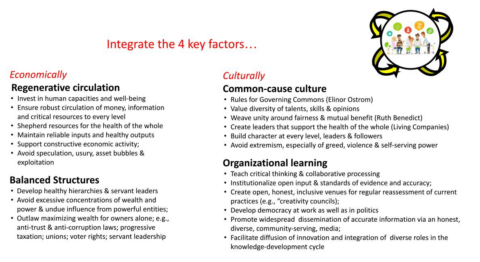Energy System Science for Network Weavers: A Summary
January 13, 2022 1 Comment
“Culture is a verb.”
– Rowen White, Seed Keeper, activist and farmer from the Mohawk community of Akwesasne
“It’s all about how things are flowing.”
– Gwen McClellan, acupressurist and holistic healer
“A living body is not a fixed thing but a flowing event, like a flame or a whirlpool.”
– Alan Watts, philosopher and writer
“Seeing energy flows so that we can engage with them in positive ways is not some mystical, esoteric art, but the role of engaged human beings.”
– Joel Glanzberg, permaculturist and sustainable builder
Last week I teamed up with Dr. Sally J. Goerner, who stewards a transdisciplinary team of researchers and practitioners in the Research Alliance for Regenerative Economics, to offer an interactive session to The Weaving Lab on the Energy System Sciences and how they might support network weavers working for social change in a variety of contexts. Energy System Sciences (ESS) is “an umbrella term for disciplines that use the study of energy flow networks to understand the laws of systemic health, growth and development in living, nonliving and supra-living systems.” ESS disciplines include: Chaos, Complexity, Resilience, Ecological Network Analysis, Self-Organization Theory, Nonequilibrium Thermodynamics, Panarchy, and others. It was a lot to present and absorb and process during our short 2 hour session, and so I have made an effort here to summarize and simplify …
Everything is made up of energy, so says “western” science and also many wisdom traditions (think spirit or chi) and indigenous peoples (see Sherri Mitchell), but many of us often don’t like to use the word “energy” (too woo woo). And perhaps that is to our detriment! Switching from a “matter” orientation about everything to an “energy” view can help us see and do things differently.
Systems are complex networks of interconnected “parts” that work together. Flows of energy of different kinds are crucial for a system to function (carbon in the biosphere, traffic in cities, supplies and information during a disaster response, ideas and emotions in a social group, nutrients on a farm, money and other resources in economies).
The Energy System Sciences (ESS) see all systems as “flow networks” or structures that arise from the circulation of resources, information, nutrients, etc. Thinking through the lens of flow, systemic health can be seen as being based on things like: investment and re-investment of key and diverse resources, healthy outflows (not polluting or poisoning the ecosystem), the velocity and spread of resources in the system, cross-scale circulation, etc. The nature and quality of these flows determines how systems are able to adapt and evolve in healthy and health-promoting ways.
ONE BIG PROBLEM now is that there is a dominant narrative stemming from the power and influence of oligarchy (rule of and for the few) and oligarchic capitalism (economies that are run by and support the few), which seeks to increase the wealth of “elites” at the expense of most people and the planet. Narrative, in contrast to story, is a way of looking at the world. In a sense, it’s a big story that influences thought, meaning and decision-making. The dominant oligarchic narrative and view is grounded in things and beliefs like “the divine right of capital and kings,” a master/slave mentality, dominance, supremacy ( based on race, gender and other markers of identity), narcissism, coercive hierarchies, “survival of the fittest,” and self-interest.
The oligarchic view cuts against the evolutionary promise of the Energy System Sciences in that it gets in the way of the kinds and qualities of flows needed to keep the whole body of humanity healthy and in right relationship with the planet. It prevents pro-social and pro-ecological evolution. For example, at a smaller scale, if we only privilege a certain part of our physical bodies (our heads or brains) over and at the expense of other parts of our bodies (for example, our hearts, our guts), this can have damaging impacts for the neglected parts and our entire bodies, and diminish our intelligence. Science is increasingly showing that our hearts and guts give us access to important information about the world around us. And our health and development are being shown to rest upon more integration and coherence between the different biological systems that make us up (digestion, vascular, nervous, etc.).
Against the oligarchic capitalist view is another view of humanity as being a collaborative learning species that can ground itself in common-cause and cooperative culture (including values of equity, justice, fairness, trust, transparency, mutualism) and seek resilient and regenerative economies and other systems that guarantee long-term human thriving for the many and for the diverse and not just the few and the alike. This narrative and set of beliefs aligns with the Energy Systems Sciences. Together they suggest that to support healthy and health-promoting webs and flows, it is important for groups of people to integrate the following core pillars, economically (especially in the etymological sense of the word – “household management”) and culturally:
- Circulate diverse resources regeneratively, at and between different scales/levels
- Create and sustain flexible and resilient structures of different and balance sizes
- Ground in common-cause values such as mutuality, trust, transparency, equity, justice, fairness, accountability
- Engaged in collaborative learning that supports intelligently adaptive responses and actions
For example, as Sally Goerner lifts up the following (it may be helpful to click on the image below):
We can also bring attention back to our own selves and how we interact with others to see how the energy system sciences can guide us. We can have stagnant energy if we are not inviting new ideas in or not releasing emotions. We can quickly get overwhelmed if we open ourselves to too much energetic flow of information or emotion, especially if it is negative or challenging. If our bodies are not structurally strong and flexible, they can be more prone to dis-ease. If our social organizations are overly rigid, they can be un-responsive to change and unable to adapt accordingly. If we are not having honest conversations with one another, that “clear the air” (and move energy through as it needs to), we can get bogged down in unhealthy interpersonal dynamics. The emotional body language and tone we convey energetically can impact our interactions with others (and flow widely in larger networks!). If we are not attending to what is otherwise sealed away in our insides (which equates with dissociation) this can also have impacts on how we are with ourselves and one another.
Bottom line: We share a hope that many more of us can become adept energy and flow scientists, artists, healers, weavers and workers as we intentionally create patterns that are the basis of the better world we sense is possible and know is necessary.

1 Comment
I attended this talk and am digging deeper into what this means for my life and work.